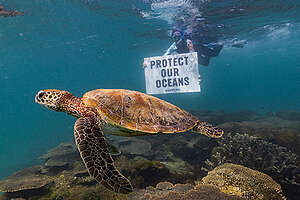The end of whaling in Albany marked a turning point in the fight to protect whales from extinction. In the 1970s, the greatest threat to whales was whaling. Now the greatest threat comes from fossil fuel companies like Woodside who are driving dangerous climate change.


1977 protests outside the last whaling station in Australia in Albany, Western Australia. Photo from the book, The Last Whale. Credit: Jonny Lewis Collection
Late one dark night, in Albany, on the southern coast of Western Australia, Greenpeace activists launched two Zodiacs from Middleton Beach. They stealthy followed the three whaling vessels as they came out of Albany harbour and blocked the entrance preventing them from leaving.
The protest lasted for several days, and although no arrests were made, the incident brought national attention to Greenpeace’s cause. This was Greenpeace’s first significant action in Australia, back in 1977.
“This wasn’t a slick operation, but it was successful because of the combination and character of the people involved … the conditions were terrible and the zodiacs going out to sea was on one hand mad but also courageous”
– Charney Barber, 1977 anti-whaling activist
Greenpeace has a deep connection to Albany, and Western Australia. For over 150 years, this small port town was known as the ’whaling capital of the world’. Whaling was a lucrative but notoriously brutal industry that was by the mid 1970s facing sustained protests..
In 1977, a small band of Greenpeace activists arrived in Albany, accompanied by several zodiac inflatable boats. As Chris Pash – a reporter at the Albany Advertiser 1975-78 who extensively covered the campaign – said at a recent Greenpeace press conference:
“Many then thought the aim of the activists was to beat the whalers at sea. This wasn’t it. That’s not what they were here for. This thought was too literal. Stop the [whale] chasers? No way.”
Instead, the activists wanted to document the horrors of whaling, and get those photos to the world’s media so the whole world could see just how cruel whaling was.
“What they [Greenpeace] did have was Bob Hunter. The Canadian journalist and writer wanted what he called a media mindbomb….the strategy was to lob information, the images of dying whales, into the minds of media consumers, preferably those watching television. Essentially changing public opinion.”
This strategy, combined with the efforts of our allies, eventually paid off.
In late 1978, the whaling station – the last in the English speaking world – closed. That same year, the Australian government passed the Whale Protection Act, which effectively ended commercial whaling in Australian waters.
The end of whaling in Albany marked a turning point in the fight to protect whales from extinction. Greenpeace continues to use its direct action tactics to draw attention to the urgent need to protect the planet’s wildlife and ecosystems.
In the 1970s, the greatest threat to whales was whaling. Now the greatest threat comes from fossil fuel companies like Woodside who are driving dangerous climate change.
Right now our ship, the Rainbow Warrior, is in Western Australia to join with coastal communities to stop fossil fuel giant Woodside Energy from drilling for gas in our precious oceans.

The Rainbow Warrior’s first day in Australia for the #WhalesNotWoodside Ship Tour. Credit: Harriet Spark / Grumpy Turtle Film / Greenpeace
Woodside wants to drill 70 gas wells in some of the world’s most biodiverse waters. If an accident were to take place, it could impact up to 12 marine parks including Ningaloo Reef.
“When I look at Albany today, where whale watching is the primary tourist attraction, where a wind farm is generating the electricity of the town, it swells me with pride. This is not the time to give up or give in. Our oceans are under attack. The ocean peoples must be protected.”
– Charney Barber, 1977 anti-whaling activist
Greenpeace is committed to challenging Woodside at every step of the way – and we need you with us. Take a stand by telling your MP you want clean energy, not Woodside’s dirty gas.
[button href=”https://greenpeace.org.au/act/clean-energy-transition” style=”emboss” size=”large” color=”#81d742″ hovercolor=”#7adb20″ textcolor=”#ffffff”]Email Your MP[/button]

